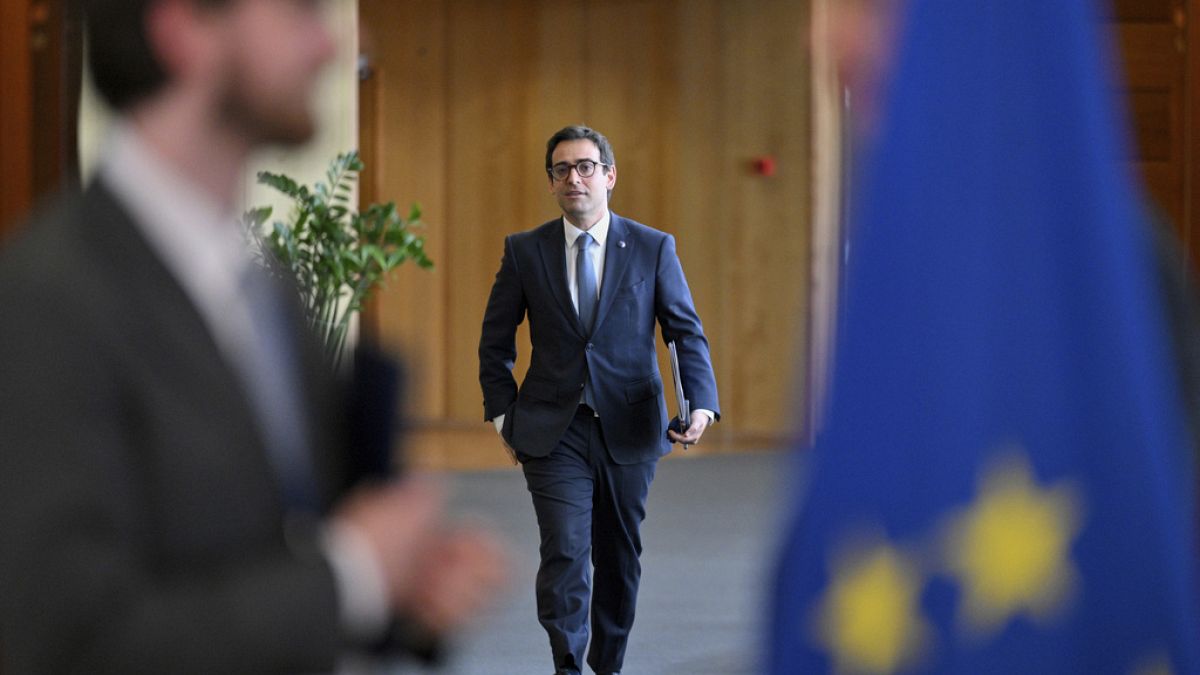Business
Millions Danced Joyfully to Her Song. She Drew on Her Pain to Write It.

It starts with a clap, and then the feet tap along to the beat: four times on each side, followed by a quick jump. As the melody rises, dancers dip low and twirl.
It’s a dance easy enough for anyone to learn, and people all around the world have done so, with everyone from an urban dance crew in Angola to Franciscan nuns in Europe showing off their moves on social media.
The “Jerusalema” dance, named for the South African hit song that inspired it, provided a moment of global joy during the lockdowns of the pandemic, a welcome distraction from the isolation and collective grief.
But it was the chorus, a lamentation over a heavy bass beat, that was balm to millions. Sung in a low alto in isiZulu, one of the official languages of South Africa, audiences didn’t need to understand the song to be moved by it.
The singer Nomcebo Nkwanyana, who goes by Nomcebo Zikode professionally, drew on her own intense pain when she wrote it.
“Jerusalem is my home,” she sang. “Guard me. Walk with me. Do not leave me here.”
After more than decade as an overlooked backing vocalist, and with her faith in music faltering, Ms. Zikode, 37, was in a dark place in 2019 when she wrote those words.
Her manager, who is also her husband, insisted she write the lyrics to help her crowd out the voices in her head that were telling her to give up on music, and herself.
“As if there’s a voice that says you must kill yourself,” she said, describing her depression at the time. “I remember talking to myself saying, ‘no, I can’t kill myself. I’ve got my kids to raise. I can’t, I can’t do that.’”
She didn’t listen to the recording of the song until a day after it was made. As the bass began to reverberate through her car, everything went dark, she said, and she almost lost control of the vehicle. She pulled over, tears streaming down her face.
“Even if you don’t believe it, this is my story,” she said. “I heard the voice saying to me, ‘Nomcebo, this is going to be a big song all over the world.’”
And that prognostication soon proved true.
In February 2020, a group of dancers in Angola uploaded a video showing off their choreography to the song, and challenging others to outdo them. As lockdowns were enforced just weeks later, the song was shared around the world.
The global success of “Jerusalema” has taken Ms. Zikode on tour to Europe, the Caribbean and the United States. It also led to her being featured on the song “Bayethe,” which would win the Grammy award for Best Global Music Performance earlier this year.
But while “Jerusalema” has brought her global renown, she has had to fight to earn any financial reward from it and to be recognized as part of its creative force.
She sued her record label, and a settlement in December called for her to receive a percentage of the song’s royalties and to be allowed to audit the books of the label, Open Mic Productions, that owns the song.
At least as important, the agreement also states that Ms. Zikode must be cited as the song’s “primary artist” alongside Kgaogelo Moagi, more commonly known as Master KG, the producer behind the instrumental track on “Jerusalema.”
But even this victory in South Africa’s male-dominated music industry comes with significant caveats: For one, Master KG is receiving a higher percentage of royalties. And Ms. Zikode said she has yet to see payment. “I’m still waiting for my money,” she said.
Open Mic did not respond to multiple requests for comment, but in a statement put out after her Grammy win, the label said: “She is a very talented artist and we welcome this agreement as a progressive resolution.”
Struggles with money are nothing new to her.
The youngest of four children born in a polygamous marriage, Ms. Zikode’s father died when she was young and her mother, the third wife, was left destitute. Desperate, her mother let a church outside Hammarsdale, a small town in South Africa’s eastern province of KwaZulu-Natal, take her daughter in for four years.
There, she slept on bunk beds among rows of other children. She sewed her own clothes and helped to clean the dormitories. The church choir was a solace, but she sorely missed home until she was able to return in the 10th grade.
Her mother sold maize or bartered what vegetables she could grow for secondhand clothes. The neighbors who would ask the young Ms. Zikode to sing for them would feed her and take her in for a few nights as her mother struggled.
When she was old enough, Ms. Zikode learned to braid other people’s hair to earn some money, but remembers self-consciously pressing her elbows to her side, for fear that her customers would smell that she could not afford deodorant.
But what she really wanted was to sing, and she got her break at an open-call audition. She spent years singing backup for gospel stars, sharing crowded apartments with other backing vocalists. When gigs dried up, she took computer classes as a career backup plan.
Ms Zikode’s first major South African hit came in 2017 when she sang vocals on the song “Emazulwini” for a well-known house music producer and D.J., Frederick Ganyani Tshabalala. But what had seemed like a long-awaited break turned into a letdown when DJ Ganyani, as he is known, did all he could, she said, to prevent her from performing the song live on her own.
“They try by all means to suppress the singers,” Ms. Zikode said of the D.J.s and producers who hold most of the power in South Africa’s music industry.
DJ Ganyani did not respond to requests for comment.
Hoping a record label would better protect her rights, Ms. Zikode signed with Open Mic, but once the deal was inked, the label went quiet, she said, and she was left hustling to record her debut album.
Feeling abandoned by the record company, her husband and manager, Selwyn Fraser, sent messages to other artists, masquerading as his wife on Instagram and Twitter, trying to get bigger names to work with her.
This outreach campaign connected Ms. Zikode with Master KG and resulted in “Jerusalema.”
It’s not only the song that has made her a household name in South Africa, but also her very public fight for her royalties and recognition, in the courts and on social media, said Kgopolo Mphela, a South African entertainment commentator.
“She’s coming across as the hero, or the underdog, taking on Goliath,” Mr. Mphela said.
For all her struggles with reaping the monetary benefits of “Jerusalema,” Ms. Zikode’s musical career has made her financially comfortable and she now has a music publishing deal with a division of Sony Music.
Her 17-year-old daughter and 8-year-old son want for nothing, she said. She and her husband renovated their home, adding an in-house studio.
Ms. Zikode can also bask in the accolades that have come with her Grammy win for “Bayethe.”
On a chilly April night in Johannesburg, in the Grammy’s afterglow, Ms. Zikode stepped out of a borrowed Bentley at an event to celebrate South Africans who have achieved international success.
As she walked the red carpet, determined to own the moment, she granted every interview request, whether from the national broadcaster or a TikTok influencer. Later that night, she accepted two checks, one for herself and one for a charity she founded that helps impoverished young women.
When she took the stage to perform the song that made her famous, she hiked up her gown to dance the “Jerusalema.”

Business
23andMe sells gene-testing business to DNA drug maker Regeneron

Bankrupt genetic-testing firm 23andMe agreed to sell its data bank, which once contained DNA samples from about 15 million people, to the drug developer Regeneron Pharmaceuticals for $256 million.
The sale comes after a wave of customers and government officials demanded that 23andMe protect the genetic data it had built up over the years by collecting saliva samples from customers.
Regeneron pledged to comply with 23andMe’s privacy policy, which allows customers to have their personal information deleted upon request.
“We have deep experience with large-scale data management,” Regeneron co-founder George D. Yancopoulos said in a statement. The company “has a proven track record of safeguarding the genetic data of people across the globe, and, with their consent, using this data to pursue discoveries that benefit science and society.”
23andMe filed for bankruptcy in March after failing to generate sustainable profits by providing medical and ancestry-related genetic testing to more than 15 million customers.
About 550,000 people had subscribed to the company’s two primary services, which hasn’t been enough to keep the company afloat. One of those services, Lemonaid Health, was not part of the sale and will be wound down, 23andMe said in a statement.
As part of 23andMe’s Chapter 11 bankruptcy, a judge approved the appointment of a privacy ombudsman to monitor the sale process and ensure compliance with privacy policies related to the genetic material submitted by customers.
That material, and the genetic data it produced, was 23andMe’s most valuable asset. The company has said any buyer must comply with current privacy protections and federal regulations.
Regeneron said it will continue to run 23andMe’s personal genomic services once the sale closes. The judge overseeing the bankruptcy must approve the sale before it can be completed.
In the months leading up its bankruptcy, 23andMe tried to attract a buyer while struggling to end a class-action lawsuit related to a 2023 data breach that gave hackers access to customer information. The company will try to resolve those claims as part of the bankruptcy.
The case is 23andMe Holding Co., number 25-40976, in the U.S. Bankruptcy Court for the Eastern District of Missouri.
Church and Smith write for Bloomberg.
Business
Edison’s safety record declined last year. Executive bonuses rose anyway

The state law that shielded Southern California Edison and other utilities from liability for wildfires sparked by their equipment came with a catch: Top utility executives would be forced to take a pay cut if their company’s safety record declined.
Edison’s safety record did decline last year. The number of fires sparked by its equipment soared to 178, from 90 the year before and 39% above the five-year average.
Serious injuries suffered by employees jumped by 56% over the average. Five contractors working on its electric system died.
As a result of that performance, the utility’s parent company, Edison International, cut executive bonuses awarded for the 2024 year, it told California regulators in an April 1 report.
For Edison International employees, planned executive cash bonuses were cut by 5%, and executives at Southern California Edison saw their bonuses shrink by 3%, said Sergey Trakhtenberg, a compensation specialist for the company.
But cash bonuses for four of Edison’s top five executives actually rose last year, by as much as 17%, according to a separate March report by Edison to federal regulators. Their long-term bonuses of stock and options, which are far more valuable and not tied to safety, also rose.
Of the top five executives, only Pedro Pizarro, chief executive of Edison International, saw his cash bonus decline. He received a cash bonus of 128% of his salary rather than the planned 135% because of the safety failures, the company said, for total compensation including salary of $13.8 million.
The cash bonuses increased for the other top four executives despite the safety-related deductions because of how they performed on other responsibilities, said Trakhtenberg, Edison’s director of total rewards. He said bonuses would have been higher were it not for safety-related reductions.
“Compensation is structured to promote safety,” Trakhtenberg said, calling it “the main focus of the company.”
Consumer advocates say the fact that bonuses increased in spite of the decline in safety highlights a flaw in AB 1054, the 2019 law that reduced the liability of for-profit utility companies like Edison for damaging wildfires ignited by their equipment.
AB 1054 created a wildfire fund to pay for fire damages in an effort to ensure that utilities wouldn’t be rendered insolvent by having to bear billions of dollars in damage costs.
In return, the legislation said executive bonus plans for utilities should be “structured to promote safety as a priority and to ensure public safety and utility financial stability.”
“All these supposed accountability measures that were put into the bill are turning out to be toothless,” said Mark Toney, executive director of The Utility Reform Network, a consumer advocacy group in San Francisco.
“If executives aren’t feeling a significant reduction in salary when there is a significant increase in wildfire safety incidents,” Toney said, “then the incentive is gone.”
One of the executives who received an increased cash bonus was Adam Umanoff, Edison’s general counsel.
Umanoff was expected to get 85% of his $706,000 salary, or $600,000, as a cash bonus as his target at the year’s beginning. The deduction for safety failures reduced that bonus, Trakhtenberg said. But Umanoff’s performance on other goals “was significantly above target” and thus increased his cash bonus to 101% of his salary.
So despite the safety failures, Umanoff received a cash bonus of $717,000, or 19% higher than he was expected to receive.
“If you can just make it up somewhere else,” Toney said, “the incentive is gone.”
The utility recently told its investors that AB 1054 will protect it from potential liabilities of billions of dollars if its equipment is found to have sparked the Eaton fire on Jan. 7, resulting in 18 deaths and the destruction of thousands of homes and commercial buildings.
The cause of the blaze, which videos captured igniting under one of Edison’s transmission towers, is still under investigation. Pizarro has said the reenergization of an idle transmission line is now a leading theory of what sparked the deadly fire.
The 2019 legislation was passed in a matter of weeks to bolster the financial health of the state’s for-profit electric companies after the Camp fire in Butte County, which was caused by a Pacific Gas & Electric transmission line.
The wildfire destroyed the town of Paradise and killed 85 people, and the damages helped push PG&E into bankruptcy.
At the bill-signing ceremony, Gov. Gavin Newsom touted its language that said utilities could not access the money in a new state wildfire fund and cap their liabilities from a blaze caused by their equipment unless they tied executive compensation to their safety performance.
In April, Edison filed its mandatory annual safety performance metrics report with the Public Utilities Commission as it seeks approval to raise customer electric rates by more than 10% this year.
In the report, Edison said that because its safety record worsened in 2024 on certain key metrics, its executives took “a total deduction of 18 points” on a 100-point scale used in determining bonuses.
“Safety and compliance are foundational to SCE, and events such as employee fatalities or serious injuries to the public can result in meaningful deduction or full elimination” of executive incentive compensation, the company wrote.
Edison didn’t explain in the report what an 18-point deduction meant to executives in actual dollar terms, another point of frustration with consumer advocates trying to determine if executive compensation plans genuinely comply with AB 1054.
“Without seeing dollar figures, it is impossible to ascertain whether a utility’s incentive compensation plan is reasonable,” the Public Advocates Office at the state Public Utilities Commission wrote in a 2022 letter to wildfire safety regulators.
To try to determine how much the missed safety goals actually impacted the compensation of Edison executives last year, The Times looked at a separate federal securities report Edison filed for investors known as the proxy statement.
In that March report, Edison detailed how the majority of its compensation to executives is based on its profit and stock price appreciation, and not safety.
Safety helps determine about 50% of the cash bonuses paid to executives each year, the report said. But more valuable are the long-term incentive bonuses, which are paid in shares of stock and stock options and are based on earnings.
The Utility Reform Network, which is also known as TURN, pointed to those stock bonuses in a 2021 letter to regulators where it questioned whether Edison and the state’s other two big for-profit utilities were actually tying executive compensation to safety.
“Good financial performance does not necessarily mean that the utility prioritizes safety,” TURN staff wrote in the letter.
Trakhtenberg disagreed, saying the company’s “long-term incentives are focused on promoting financial stability.” A key part of that is the company’s ability “over the long term to safely deliver reliable, affordable power,” he said.
Trakhtenberg noted that the state Office of Energy Infrastructure Safety had approved the company’s executive compensation plan in October, saying it met the requirements of AB 1054, as well as every year since the agency was established in July 2021.
The Times asked the energy safety office if it audited the utilities’ compensation reports or tried to determine how much money Edison executives lost because of the safety failures.
Sandy Cooney, a spokesman for the agency, said that the office had “no statutory authority … to audit executive compensation structures.” He referred the reporter to Edison for information on how much executive compensation had actually declined in dollar amounts because of the missed safety goals.
A committee of Edison board members determines what goals will be tied to safety, Trakhtenberg said, and whether those goals have been met.
Even though five contractors died last year while working on Edison’s electrical system, the committee didn’t include contractor safety as a goal, according to the company’s documents.
And the committee said the company met its goal in protecting the public even though three people died from its equipment and there was a 27% increase in deaths and serious injuries among the public compared to the five-year average.
Trakhtenberg said most of the serious injuries happened to people committing theft or vandalism, which is why the committee said the goal had been met.
Edison has told regulators that if its equipment starts a catastrophic wildfire, the committee could decide to eliminate executives’ cash bonuses.
But the company’s documents show that it hasn’t eliminated or even reduced bonuses for the 2022 Fairview fire in Riverside County, which killed two people, destroyed 22 homes and burned 28,000 acres.
In 2023, investigators blamed Edison’s equipment for igniting the fire, saying one of its conductors came in contact with a telecommunications cable, creating sparks that fell into vegetation.
Trakhtenberg said the board’s compensation committee reviewed the circumstances of the fire that year and found that the company had acted “prudently” in maintaining its equipment. The committee decided not to reduce executive bonuses for the fire, he said.
In March, the Public Utilities Commission fined Edison $2.2 million for the fire, saying it had violated four safety regulations, including by failing to cooperate with investigators.
Trakhtenberg said the compensation committee would reconsider its decision not to penalize executives for the deadly fire at its next meeting.
TURN has repeatedly asked regulators not to approve Edison’s compensation plans, detailing how its committee has “undue discretion” in setting goals and then determining whether they have been met.
But the energy safety office has approved the plans anyway. Toney said he believes the responsibility for reviewing the compensation plans and utilities’ wildfire safety should be transferred back to the Public Utilities Commission, which had done the work until 2021.
The energy safety office has rules that make the review process less transparent than it is at the commission, he said.
“The whole process, we feel is rigged heavily in favor of utilities,” he said.
Business
Cable giant Charter to buy Cox in a $34.5-billion deal, uniting providers that serve SoCal

Charter Communications and Cox Communications plan to merge in a $34.5-billion deal that would unite Southern California’s two major cable TV and internet providers to sell services under the Spectrum brand.
The proposed consolidation, announced Friday, comes as the industry grapples with accelerating cable customer losses amid the shift to streaming.
The companies could face even more cord-cutting after their long-time programming partner, Walt Disney Co., begins offering its ESPN sports channel directly to fans in a stand-alone streaming service debuting this fall.
If approved by Charter shareholders and regulators, the merger would end one of the longest TV sports blackouts.
Cox customers in Rancho Palos Verdes, Rolling Hills Estates and Orange County would finally have the Dodgers’ TV channel available in their lineups. For more than a decade, Cox has refused to carry SportsNet LA because of its high cost.
Charter distributes the Dodgers channel as part of a $8.35-billion television contract signed with the team’s owners in 2013. Charter has bled hundreds of millions of dollars on that arrangement and now offers the channel more widely via a streaming app.
The Atlanta-based Cox is the nation’s third-largest cable company with more than 6.5 million digital cable, internet, telephone and home security customers. Stamford, Conn.-based Charter has more than 32 million customers.
Charter dramatically expanded its Los Angeles presence in 2016 by acquiring Time Warner Cable for more than $60 billion.
The Charter-Cox combination would have 38 million customer homes in the country — a larger footprint than longtime cable leader, Philadelphia’s Comcast Corp.
“This transformational transaction will create an industry leader in mobile and broadband communication services and seamless video entertainment,” Charter Chief Executive Christopher Winfrey said in a conference call with analysts.
Winfrey would become the proposed entity’s CEO.
A major motivation for the deal was to be able to combine operations in Los Angeles, Orange and San Diego counties where both services currently operate and add attractive markets like Phoenix, Winfrey told analysts.
“Our network will span approximately 46 states passing nearly 70 million homes and businesses,” Winfrey said.
Cox is privately held. The billionaire Cox family, descendants of an Ohio press baron who bought his first newspaper in 1898, began acquiring cable systems in 1962 and has since held them with a tight grip. The Cox cable assets were long seen as a lucrative target.
Last year, Cox generated $13.1 billion in revenue and $5.4 billion in adjusted earnings before interest, taxes, depreciation and amortization.
“Cox was always the first name that would come up in consolidation conversations… and it was always the first name dismissed,” longtime cable analyst Craig Moffett wrote in a Friday research note. “Cox wasn’t for sale.”
Until it was.
In an unexpected twist, the name of the merged company would be changed to Cox within a year of the deal closing. However, its products would carry the Spectrum moniker.
The Cox family would be the largest shareholder, owning about 23% of the combined entity’s outstanding shares.
Charter shares got a slight bump on Friday’s news, climbing nearly 2% to $427.25.
“Cable is a scale business. [The] added size should help Charter compete better with the larger telcos, tech companies and [Elon Musk’s] Starlink,” said Chris Marangi, co-chief investment officer of value at the New York-based Gabelli Funds, a large media investor.
Adding the Cox homes will allow Charter to expand distribution for its El Segundo-based Spectrum News channel.
Charter said it would absorb Cox’s commercial fiber, information technology and cloud businesses. Cox Enterprises agreed to contribute the residential cable business to Charter Holdings.
Cox Enterprises would be paid $4 billion in cash and receive about $6 billion in convertible preferred units, which could eventually be exchanged into Charter shares. The Cox family would get about 33.6 million common units in the Charter Holdings partnership, worth nearly $12 billion.
The combined entity will absorb Cox’s $12 billion in outstanding debt.
Charter’s ability to navigate the challenged landscape was a factor in the family’s decision, said Cox Enterprises Chief Executive Alex Taylor, a great-grandson of the company’s founder, told analysts.
“Charter has really impressed us above all others with the way they have spent capital,” Taylor said. “In the last five years, they’ve spent over $50 billion investing” in internet infrastructure and building a wireless phone service.
“This deal starts with mobile,” cable analyst Moffett wrote. “Cox is relatively late to the wireless game. But that only means that the opportunity in [the combined companies’] footprint is that much larger.”
The companies said they could wring about $500 million a year in annual cost savings.
The combined company would have about $111 billion of debt.
Cox would have two directors on the 13-member board, including Taylor, who would serve as chairman.
Advance/Newhouse would keep its two board members. Advance/Newhouse would hold about 10% of the new company’s shares.
The transaction is expected to close at the same time as Charter’s merger with Liberty Broadband, which was approved by Charter and John Malone’s Liberty Broadband stockholders in February.
After the consolidation, Liberty Broadband will no longer be a direct Charter shareholder.
The Associated Press contributed to this report.
-

 Austin, TX1 week ago
Austin, TX1 week agoBest Austin Salads – 15 Food Places For Good Greens!
-

 Politics1 week ago
Politics1 week agoPresident Trump takes on 'Big Pharma' by signing executive order to lower drug prices
-

 News5 days ago
News5 days agoAs Harvard Battles Trump, Its President Will Take a 25% Pay Cut
-

 Technology1 week ago
Technology1 week agoMexico is suing Google over how it’s labeling the Gulf of Mexico
-

 Business1 week ago
Business1 week agoIn-N-Out Burger adds three new California locations to list of 2025 openings
-

 Politics1 week ago
Politics1 week agoDHS says Massachusetts city council member 'incited chaos' as ICE arrested 'violent criminal alien'
-

 News1 week ago
News1 week agoWhy Trump Suddenly Declared Victory Over the Houthi Militia
-

 Politics5 days ago
Politics5 days agoRepublicans say they're 'out of the loop' on Trump's $400M Qatari plane deal














